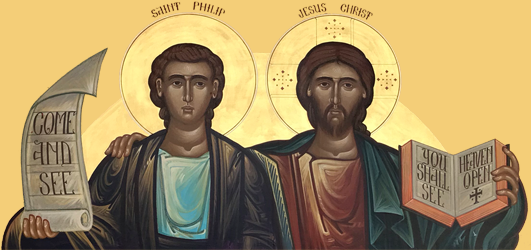Leviticus 10:1-2
“Now Nadab and Abihu, Aaron’s sons, each took his censer and put fire in it, put incense on it, and offered strange fire before the Lord, which He had not commanded them. So fire went out from the Lord and devoured them, and they died before the Lord.” (OSB)
As we saw last week in Leviticus 8, the Aaronic priesthood is inaugurated with baptism, with the sprinkling of blood, and with the anointing of oil—on both the priestly vestments and the whole Tabernacle complex. Before their priestly service begins, however, Aaron and his sons must spend seven days and nights at the door of the Tabernacle as part of their consecration. On the eighth day the Aaronic priesthood begins its official service (Lev 9). God confirms this inauguration and service in an awesome and fearful sign: Just as fire will fall from heaven to consume Elijah’s sacrifice in his contest with the prophets of Ba’al (3 Kgdms 18:20-40), so here in Lev 9 fire comes out from the Tabernacle and consumes the sacrifices, signifying God’s acceptance of the Aaronic priesthood.
The incident that follows is shrouded in obscurity, but at the same time seems to reflect a general pattern in Scripture: at the beginning of new institutions that mark the progress of salvation-history, there are often cataclysmic events that reveal the seriousness and severity of who and what God is, and thus reveal how the people of God are to regard God, His holy things, and His revealed will for human life and worship. One such event in the New Testament is the demise of Ananias and Sapphira (Acts 5:1-11), with the effect that “great fear came upon all the church and upon all who heard these things” (Acts 5:11).
No one really knows what “strange fire” means because the text of the Law itself gives no clear indication as to the exact nature of Nadab and Abihu’s offense. There isn’t even any implication that they intended to do something wrong. The crucial point is that they were doing something which God “had not commanded them” (Lev 10:2). They were, it seems, improvising. At the very inception of the Levitical system, they were planting the seed of syncretism—of mixing true and false worship—and so were beginning to depart from what God had revealed in exchange for their own “construct” of worship. Indeed, in light of Aaron’s own predilection for this kind of thing (cf. the Golden Calf), one might rightly apply the proverb, “Like father, like son.” No wonder early Fathers such as Sts. Cyprian and Irenaeus saw this story as a strong warning against tolerating heresy.
God’s response, while terrifying and severe, is pedagogical and purifying—it is meant to instruct and teach Israel and especially the priests and religious leaders about the seriousness with which God’s people are to relate to the Mysteries, so as to preserve Israel in purity and holiness before the Lord. This is why we pray after Communion, “Thou who art a fire consuming the unworthy, consume me not, O my Creator, but rather pass through all my body parts, into all my joints, my reins, my heart.” We approach the Chalice “with faith and love,” but also “in fear,” knowing that our participation in Christ’s divine Body and precious Blood is the self-giving of God Who is at one and the same time both Love and a “consuming fire” (1 Jn 4:8; Heb 12:29). Thus the priest says after Communion, in the words of Isaiah, “Lo, this has touched our lips and shall take away our iniquities and purge away our sins” (Isa 6:7).
In his ingenious way, the early Christian writer, Origen, compels us to ask, if the Church and our souls are the living Temple of God, what fire glows on our altar (Hom. Lev. 9.9.7)? Is it the “strange fire” in the (modern equivalents to) “spectacles of the circus, in the contests of the horses, in the contest of athletes,” or the burning passions of “wrath/rage” and “love of the flesh”? Or are we like Cleopas on the road to Emmaus whose heart burned within him when Christ “opened the Scriptures” to him (Lk 24:18, 32), and like the Psalmist who prays of himself, “My heart burned within me and in my meditation fire became inflamed” (Ps 38:4)?
~ By Reader Justin Gohl

